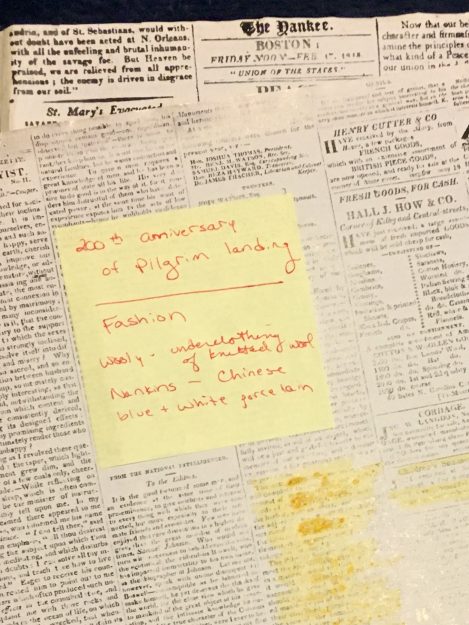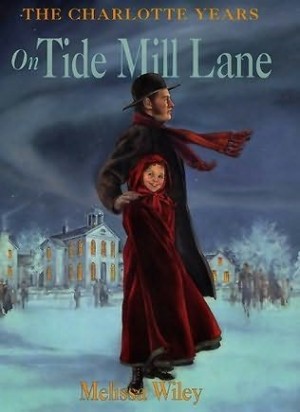day nineteen: heartbreak

Feb. 17, 1818 Yankee article with my researcher’s sticky note still in place
I woke up to the news that the National Endowment for the Arts and National Endowment for the Humanities are among the programs slated for elimination in the new administration’s budget proposals. Not exactly a surprise, but still it smacked me in the gut, and I’ve walked around feeling ill all day.
Anyone who knows me knows why I’m sick about the scrapping of the NEA. But losing the National Endowment for the Humanities as well? Takes my breath away. If you’ve read my Charlotte books, you’ve seen one NEH project in action. The NEH funded the US Newspaper Program, which gave grants to all 50 states to preserve old, crumbling newspapers on microfilm.
Massachusetts, for example, received $770,942 in NEH support to catalog over 8000 titles, including the 1680 Publick Occurrences, America’s first newspaper. There are treasures in those archives that would have been lost to time, but for this federal funding program.
 You know that hurricane I wrote about in Tide Mill Lane? I learned of it in The Yankee—including whose roof was torn off and what other damages Roxbury folks suffered. The Brighton Cattle Show, right down to all the winners? The Yankee. The vandalism of the Bible in a Roxbury church. The first gaslights in Boston. The parade, the details of the wagons and the whole celebration. The first elephant brought to North America. All that priceless historical information came right out of newspaper articles that are available on microfilm at the Boston Public Library.
You know that hurricane I wrote about in Tide Mill Lane? I learned of it in The Yankee—including whose roof was torn off and what other damages Roxbury folks suffered. The Brighton Cattle Show, right down to all the winners? The Yankee. The vandalism of the Bible in a Roxbury church. The first gaslights in Boston. The parade, the details of the wagons and the whole celebration. The first elephant brought to North America. All that priceless historical information came right out of newspaper articles that are available on microfilm at the Boston Public Library.
Jane was still going through treatment for leukemia in NY when I was researching and writing the first two Charlotte books. I couldn’t travel. My editors at HarperCollins arranged a stipend for on-site researchers who made copies for me. “ANYTHING AT ALL you can get me from the years 1800-1820,” I asked. “The whole paper, not just the news articles. I want advertisements, editorials, everything.” Amy Sklansky and Theresa Peterson put in dozens of hours printing off copies. I pored over those riches for months. I still have them—boxes of Yankee articles on that slippery microfilm paper. I use the story about the orchard thieves (“a man named Peter Twist and two well-dressed women”) in writing workshops to this day.
That’s what the NEH did for me, and for you, if you enjoyed my books. And that’s one tiny fraction of what those tax dollars funded.
